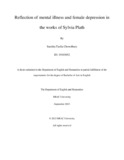| dc.contributor.advisor | Noman, Abu Sayeed Mohammad | |
| dc.contributor.author | Chowdhury, Samiha Tasfia | |
| dc.date.accessioned | 2024-04-18T07:27:07Z | |
| dc.date.available | 2024-04-18T07:27:07Z | |
| dc.date.copyright | ©2023 | |
| dc.date.issued | 2023-09 | |
| dc.identifier.other | ID: 19103052 | |
| dc.identifier.uri | http://hdl.handle.net/10361/22636 | |
| dc.description | This thesis is submitted in partial fulfillment of the requirements for the degree of Bachelor of Arts in English, 2023. | en_US |
| dc.description | Cataloged from PDF version of thesis. | |
| dc.description | Includes bibliographical references (pages 45-56). | |
| dc.description.abstract | Every time someone tries to be physically fit, they neglect their mental health, which is inextricably linked to their physical health. Without mental health, physical health is of no value. Both are equally essential to a person's well-being, but we consistently disregard our mental health. Moreover, our physical health is visible; for instance, if we cut ourselves, we can see the blood and know how to treat the wound. However, our mental health condition cannot be seen, and because it cannot be seen, everyone tends to be reluctant to discuss it. Consequently, our invisible health, which is equally as important as our physical health, became stigmatized. Unless we suffer from mental illness, few of us understand the significance of mental health. In the 1950s, the situation was significantly worse than it is currently. At that time, people were also sexually prejudiced, so a mentally ill woman was not everybody's cup of tea. No one dared to write empathetically about female mental illness and depression instead of labeling them "crazy women." Then there was Sylvia Plath, a writer of that era who suffered from mental illness and was courageous enough to write a semi-autobiographical work about it. Her literary works illustrated her struggle with mental illness and depression. In this paper, I would like to analyze the works of Sylvia Plath to discuss the issues of mental illness and depression in women. In my paper, female mental health will be prioritized as earlier research shows that women’s mental health is always neglected compared to men’s. In addition, I would like to connect this theme of mental issues to psychoanalytic theory and feminist literary criticism. I would also like to compare the current situation of mentally ill women worldwide with Sylvia Plath's works. My research paper aims to examine the theme of mental illness in Sylvia Plath's works. | en_US |
| dc.description.statementofresponsibility | Samiha Tasfia Chowdhury | |
| dc.format.extent | 56 pages | |
| dc.language.iso | en | en_US |
| dc.publisher | Brac University | en_US |
| dc.rights | Brac University theses are protected by copyright. They may be viewed from this source for any purpose, but reproduction or distribution in any format is prohibited without written permission. | |
| dc.subject | Sylvia Plath | en_US |
| dc.subject | Feminism in literature | en_US |
| dc.subject | Female depression | en_US |
| dc.subject | Women psychoanalysis | en_US |
| dc.subject.lcsh | Women in literature | |
| dc.subject.lcsh | Women and psychoanalysis | |
| dc.title | Reflection of mental illness and female depression in the works of Sylvia Plath | en_US |
| dc.type | Thesis | en_US |
| dc.contributor.department | Department of English and Humanities, Brac University | |
| dc.description.degree | B.A. in English | |

